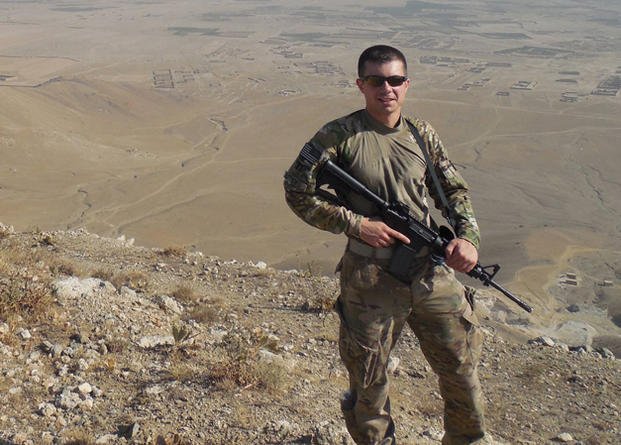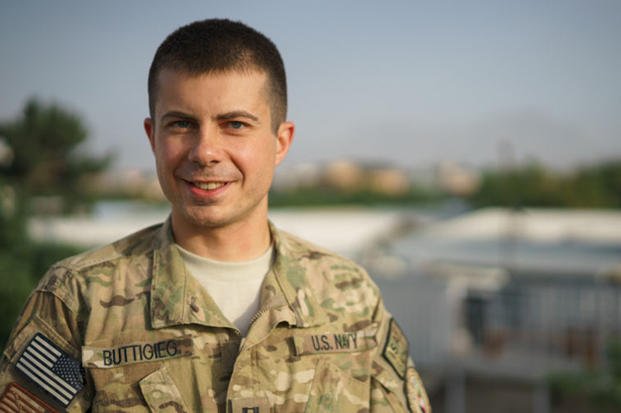Nathan Wertz is the editor of ThisAndThatTech.com.
Pete Buttigieg, United States Navy Lieutenant and veteran of the War in Afghanistan, is a politician currently serving as the Mayor of South Bend, Indiana.
Pete has a notable background as the youngest mayor of a city with a population over one hundred thousand (elected at 29 in 2011), a graduate of Harvard University, Rhodes Scholar, Aspen Institute Rodel Fellow, John F. Kennedy New Frontier Fenn Award recipient, and first openly gay executive in the state of Indiana, even being hailed by outlets as the "first gay president" in the United States of America.
Pete shares details with us of his time in service, what it's like to be involved in U.S. politics, and how to pursue that career path.
Can you give us a brief background on where you grew up?
I was raised in South Bend. My parents came to South Bend to work at Notre Dame and I was born pretty soon after that in '82. Went to St. Joe High School and then left for a while for school and work, but moved home around 2008.
And you were elected mayor of South Bend, Indiana, in 2012?
2011. Yeah, I took office in '12.
At the time you were the youngest mayor in a population over 100,000.
Yeah, at that time, I was. So I think before me it was the mayor of Pittsburgh who was quite young. He was 26 when he came in. And there's someone in Michigan who I think took the title from me, but you know for at least a period of time I was the youngest in America for a city our size.
And look, to be honest, running for office isn't something younger people normally pursue. What was the catalyst to make you want to pursue something like that?
Well, for us it had a lot to do with the state of affairs in South Bend. Having grown up there, I knew what some of our challenges were. And as I grew older, more and more conversations with friends, especially people who, like me, had moved away. You know we were having more and more conversations about what was going on back home and what it would take to really reenergize the city.
And I believed in South Bend, I cared about the place, but felt that it needed really a different kind of energy and needed somebody to step forward and say that it was the kind of place young people want to be excited about, growing up in, or moving home to.
Plus, I thought that I had a background that fit well. What the city really needed at the time was somebody who's not too caught up in various local party factions and someone with a little more business or economic experience, which was my background. So it was a matter of feeling like in that moment I had the attributes that the city really needed.

When did you decide to join the military?
I joined the Reserves and started drilling in late 2009.
And why did you decide to join the military at that point? You had already graduated from Harvard.
I mean I would say, like a lot of people, it probably first entered my mind around the time of 9/11, but it always felt like there was something else going on that I needed to focus on, whether it was school or work.
And things really started to shift for me when I visited Iowa. I was a campaign volunteer and knocking on doors in a low-income area of South Central Iowa. I was with a couple of old friends from Harvard. It was just really striking how many teenagers from these rural towns were headed straight to the military as soon as they were old enough.
And it prompted some soul searching for us. I got to thinking about how many of my Harvard classmates had served and there weren't many. Of course, I was raised on some of the legends of the Kennedys and other figures from previous generations, when actually going to a place like Harvard meant it was almost assumed that you would serve. And by the time I was there, the reverse was true.
And so it prompted me to ask myself, "If teenagers in rural communities are routinely stepping up and serving, why have I not been wearing my country's uniform?" And I saw the Reserve as an opportunity to continue to have my career in the private sector. I was in management consulting at the time, but also be doing some kind of public service.
Any takeaways from your time serving?
Yeah, so a lot of things, obviously. I think for anyone who serves, it's very formative.
And for me a lot of it had to do with teamwork, understanding how you build a diverse group of people to do a mission, how to make sure people are flexible, that people are communicating well.
And obviously you learn a lot about how to adapt. There's the kind of plan that's on paper and then there's how things actually get done. And I think anyone, especially in the deployed environment, figures out very quickly how to take what's in the book and then adapt that to the reality on the ground.
Did people know you were a mayor or was that something you kept more close to yourself?
So I certainly didn't go around broadcasting it. The people in my unit figured it out pretty quick. It was an intel unit and of course they're gonna Google the new guy.
There's a healthy amount of razzing when I got there, but within a few days it wore off. You know I was driving and guarding vehicles a lot. When somebody got in my vehicle, I don't think they really much cared what my day job was. They just wanted to know if I was gonna keep them safe.
But to others who I had more indirect contact with, even my roommate, actually, because it wasn't somebody from my unit, I don't think he had any idea the entire time that I was there that I was a Reservist, let alone what my day job was.
So you didn't have the nickname, "The Mayor?" I feel like that's such a missed opportunity...
[laughs]. There were a few people who called me "The Honorable Lieutenant," so I got to wear that well.
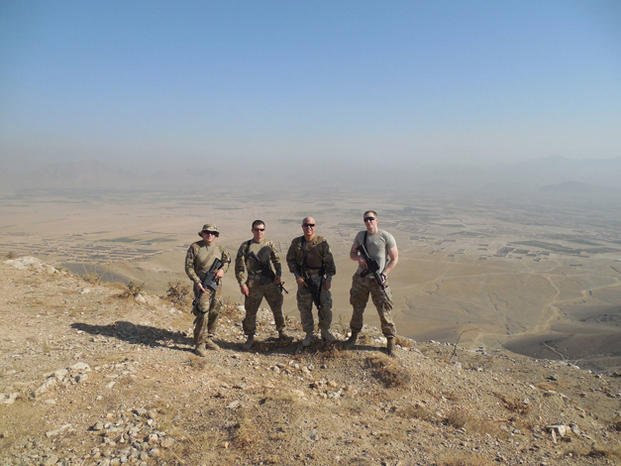
When you got back from deployment, did you reenter your position as mayor fairly quickly? How did that play out?
Yeah, you know the military has gotten better and better at helping people handle redeployment and return. In my case, it was difficult to take as much leave as was offered. I think I was encouraged to take several weeks, but we figured one week was about as much as I could get away with. So that's what I did, just because once I was home, I couldn't really not be mayor for long.
How would you describe your job to a layman who asks what you do for a living?
Well, I guess I would say I have two jobs. One is to run an administration of about a thousand people who represent everything from police officers to firefighters to office clerks and people who pick up the trash. And just making sure that that organization is tuned up in the right way and serves residents well.
My other responsibility is as a leader for a community of a hundred thousand people, trying to set the right tone, trying to call people to their highest values, to trying to heal divisions and build solidarity in a community that's very diverse, that goes through a lot of ups and downs like any community does.
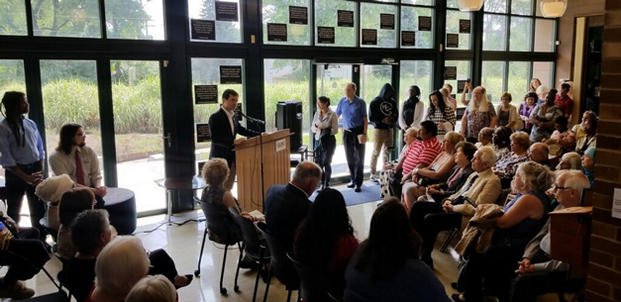
How has your military service influenced your position as mayor?
Well, I think that experience has certainly been helpful to me. You know understanding how to operate in a deployed environment has helped me be more nimble and flexible in a civilian environment.
I'd say one experience I've often had with veterans is you have a sense of perspective and a sense of calm. Some of the situations that come along that can be very stressful, you have a bigger frame of reference that helps you put them in context and not get thrown off by them too much.
Any moments that come to mind where your position has significantly changed or problems along the way?
Well, every day is different. A good day is one where you're working on the priorities you set out, which in my first term had to do with making abandoned houses, public safety, and our downtown streetscape. Today, it continues to be a public safety, but also working on things like transportation, infrastructure, and parks and public spaces.
So a good day is one where we're on the front foot, but there are a lot of days where we simply have to respond to whatever is going on, kind of good, bad, or indifferent around us. And you know the job is really about understanding the two or three things that deserve to be at the top of the list and how to lay aside the hundred or so that may be important, but you can't get to right away.
My trajectory has been pretty straightforward, except for the period when I decided I would run for chair of my political party at the national level, which was another experience that I learned a lot from. But wound up ending that experience more appreciative than ever of the rewards of a job like being mayor of your hometown.
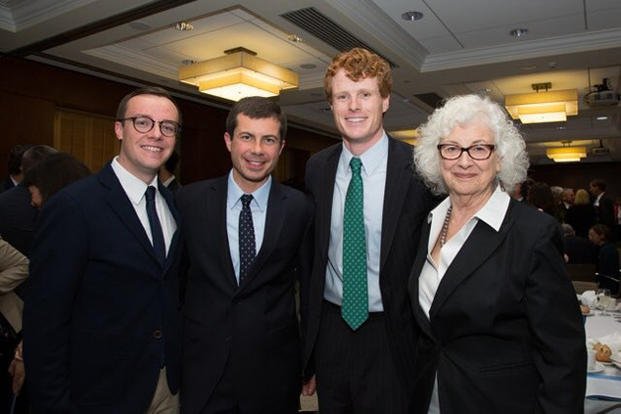
We always hear about burnout in certain positions. You spend the majority of your day with mayoral activities, even with responsibilities after hours. Is it plausible to have work/life balance in your field? And if so, how do you personally manage that?
It's not easy because the job is always on and, as you said, it involves a lot of nights and weekend commitments. But you learn to, as you do in any demanding job, you learn to carve out time for yourself. Physical fitness is a really important part of that. And I would say being married has also helped me a lot with work/life balance because there's someone else in my life who is going to fight to make sure that we get enough time together and I'm taking care of myself.
Military.com has a lot of active duty and veteran readers that may someday want to work in your field. If you were to mentor somebody to get to where you're at today, what is the optimum path to travel? Any shortcuts? What comes to mind?
Well, the great thing about public service is that there's no set professional path that you have to follow. We have a lot of different ways for citizens to assume leadership roles. And if somebody has served in uniform, then they've already done a lot to qualify themselves for public service and leadership. I think the most important thing is to cultivate the experience and habit of listening to learn to engage people with radically different values or experiences and incorporate what they have to say into a bigger picture.
And the other thing that I think is great about local government and local leadership is that it's sometimes a little easier to make sense of than other levels of government. I think it's more likely to welcome a newcomer or an outsider. I was not particularly well-connected locally when I first ran for mayor and a year later I was in charge, so it shows if you have good ideas, if you engage people, and if you pay attention to what they have to say and build a good team around you that can help you be responsive, then really those doors are open to anybody.
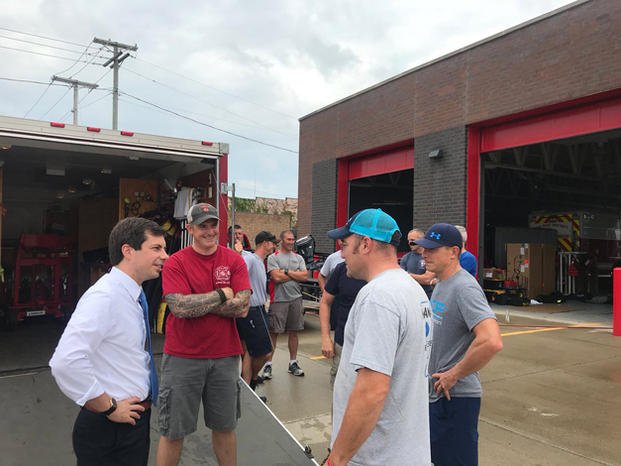
It is difficult for some to get in front of people, put their ideas out there, and get judged based on that. Is that a muscle you have always had or was it developed? Were you nervous at times putting yourself out there?
I think practice teaches you to develop a thick skin. You also learn how to respond – how to make sure things go well, but also how to respond when they don't. And like anything else, the more time you spend in a walk of life or in a professional space, the more comfortable you get with the boundaries and the ups and downs that it has to offer.
Due to the advent of the internet, will it eventually be possible to win an election focused more on internet/social media rather than knocking on doors and shaking hands? Will we get to that point?
Well, I'm a fan of some of the more old-fashioned tactics. I'm a big believer in face-to-face interaction, but I think it's certainly the case that things are changing. I think phone banking will probably become less effective over time because people are less likely to take phone calls that they don't know.
And I think there's a huge opportunity on the internet side. I think the Democratic Party is behind on this. I think both parties are looking at it, but my party has a lot of catching up to do, if you just look at the percentage that we currently spend on digital communications in campaigns. And I think whoever figures that out – and I believe this cycle, 2018 election that's coming up, will probably produce a few people who will be very impressive on this, we just don't know who they are yet. But when they do, I think we ought to pay close attention who shows early signs of mastering digital campaigning, because I think – yeah, bottom line, I think it could be a huge factor.
I watched your live stream drive around South Bend with Mark Zuckerberg of Facebook last year. Did you know him from college?
Oh, you know I didn't know – yeah, we overlapped in college. I didn't know him very well at the time, but I've gotten to know him since, especially while I was in the process of running for DNC Chair. And obviously I love showing off South Bend to anybody. Let him come see our city for himself.
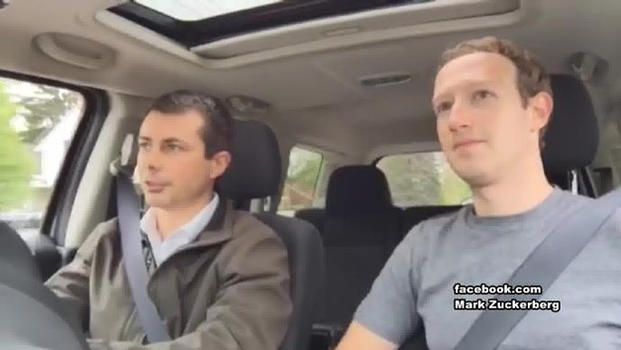
Any books, podcasts, or mentors that maybe helped you along the way, that you'd like to recommend for people?
Oh, tons. Let me think. There's some that were especially useful. I'm a big fan of history because everything that we do, there's been some kind of precedent or pattern for it. And I think even good television tells us a lot about politics. Shows like "The Wire" have a lot to offer in understanding how cities work.
I enjoyed reading about Teddy Roosevelt right around the time I was first running for mayor. And it was interesting to come into contact with someone who had an enviable level of energy and focus. And probably the best novel I've read about politics recently is called "Wolf Hall." It's about the time of Henry the VIII, but there are a lot of lessons from there that are not that different.
What's next for you? Are you thinking about running for mayor again? There's been rumors you may run for president. People talk about that because you have an interesting background. Where do you see yourself?
Yeah, a lot of other folks have lots of ideas about what my next steps are to be, but obviously that's a discernment process that you just have to go through from time to time. Right now, most of my energy is going into serving as mayor, of course. And then my political energy is mostly going into helping people that I believe in over the next six weeks between now and election day. Once that's happened and we've gotten through the midterms, I think that'll be a healthy time to step back and think about what my own next moves ought to be.
